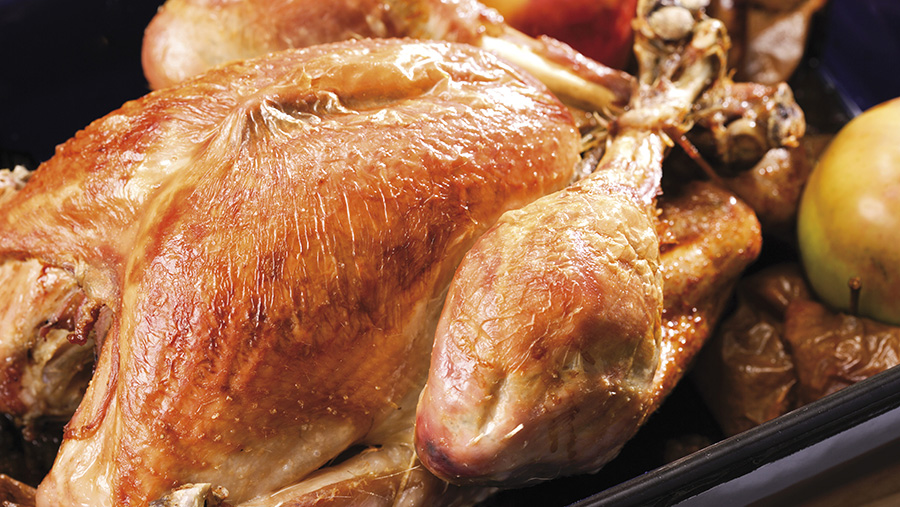Poultry farmers share turkey marketing tips at trade meeting
 © Creativ Studio/Heinemann-imageBROKER/REX/Shutterstock
© Creativ Studio/Heinemann-imageBROKER/REX/Shutterstock Tap “free-range turkey” into Google and the top link to appear will likely be Kelly’s, famous for its brand of bronze birds.
It’s no accident, either. The business has invested heavily in its online offering and, according to Phil Regan of Kelly Bronze, the website accounted for 79% of turkey orders – aside from butcher’s trade – in Christmas 2015.
He told the Anglian Turkey Association’s (ATA) post-mortem meeting this total was up from just 5% in 2000, and is allowing the company to offset the ever-increasing cost of posting out order forms. It is also saving time and building awareness of the brand.
See also: Profile of Kelly Bronze turkeys
Kelly has cut the number of mail order forms sent from 15,600 in 2009 to 10,000 last year, and looks to do so further next Christmas.
“Only 17% of our orders came by form,” explained Mr Regan, “and that may have been by telephone. They are not being sent in. They are just prompting people to buy. I am not saying they are worthless, don’t get me wrong, but their days are perhaps numbered.”
Top tips for marketing with technology
- Website: It helps consumers find you, find out more about you and buy from you. Even if you are happy with the numbers sold, it can free up time
- Mobile and tablet: It is essential that your website works on mobile phones and tablets. Almost half of Kelly’s online orders came from such devices in 2015
- Card machine: While the cost of running one is off-putting, it is worth considering as the culture of paying for products in changing – only 18% of Kelly’s collection customers paid cash last Christmas
- If you use marketing emails, it is the ones with practical information – such as a last minute reminder of a farm’s location – that will be opened the most
- Secret shopper: Consider asking a family friend to call and enquire about an order, and report back on how well the call was taken – it can be a useful exercise, even if you consider your customer service excellent.
Market electronically
Instead, email is the preferred communication media for Kelly customers today – more than 95% will leave an email address, building a database of potential future customers and reminding existing ones that Christmas is on the way.
The company uses Mailchimp, an email marketing company, that manages mass mailshots – and provides accurate feedback.
Using such technology has highlighted the emails that are most effective. For example, some 45% opened initial marketing emails, and 10% clicked through to a website.
But when the final message was sent out offering practical directions to the farm for collection, a whopping 79% of consumers engaged with the message.
“If you’re selling sausages, or cranberry sauce, or hams – whatever it might be, that is the time to advertise it,” explained Mr Regan.
Indeed, adding small extras to home deliveries and offering them at the farmgate proved a lucrative additional line of income.
“It doesn’t take an awful lot to get things like that organised and get them on the system – some 2,000 of our orders added them.
“We took another £3,000 just for putting something else in the home-delivery box – you may only make a quid on top, but it soon adds up.”
Card is king
The vast majority of customers at Kelly’s headquarters this year eschewed cash – only 18% brought physical money with them.
“A card machine may not be something you’re keen to do,” said Mr Regan. “But 51.1% paid by debit card.”
This means lower transaction fees, but it also suggests that the culture of making payments is changing.
Another possible benefit is yet another “add on” opportunity – people seem to buy more when paying by card, simply because there is perhaps less focus on exact amounts paid.
Trade in 2015
Butchers Gareth Doherty and Greg Strolenberg, of Lavenham butchers, said they worked hard to ensure a customer left with a whole bird, rather than just a crown last Christmas.
Their strategy was to suggest that a customer would be paying for a whole bird regardless, but would happily remove the legs and package them separately – or even keep them themselves.
They, and farmers at the ATA meeting, concurred that there had been some movement from the crown towards a small whole bird. Mr Doherty suggested shoppers may be feeling a little more wealthy than in recent years, and want a “centrepiece” for the Christmas table.
But warm weather hampered this sentiment, with growers acknowledging it had been an excellent season, resulting in more heavy birds than in cooler years.
Despite this, turkeys sold well and, while 45 producers used the ATA’s turkey exchange – slightly up on last year – total turkeys traded was down at 8,400. More than 525,000 birds have been traded through this clearing house since it began in 1970.
Most producers kept prices roughly static in 2015, with some opting for small increases.
